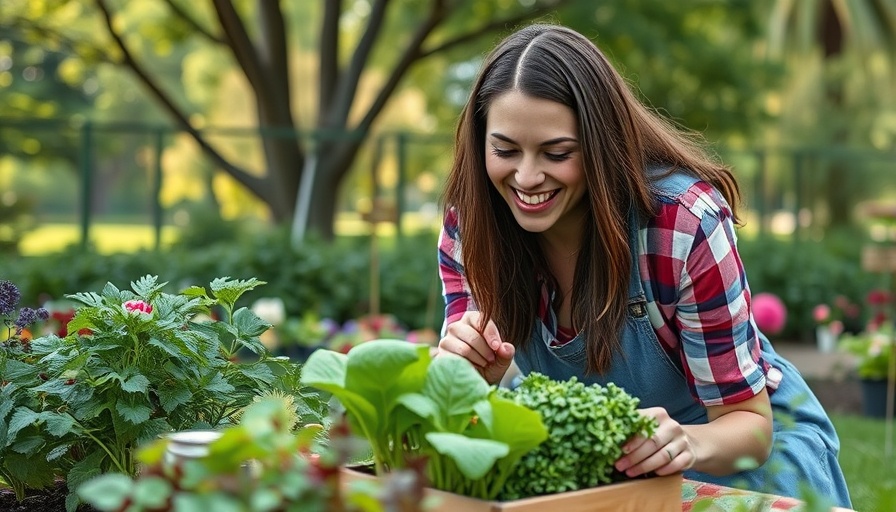
Discover the Joy of Growing Your Own Tiny Salad Garden
In today's fast-paced world, growing your own tiny salad garden is not just a hobby—it's a rewarding journey accessible to everyone. The charm lies in its simplicity: a few pots, seeds, and a sprinkle of love can yield an abundance of fresh greens right from your balcony or kitchen windowsill.
In 'Growing Your Own Tiny Salad Garden!', the discussion dives into the delightful world of tiny gardening, exploring key insights that sparked deeper analysis on our end.
Why Choose a Tiny Salad Garden?
Imagine stepping outside to harvest fresh lettuce, basil, and cherry tomatoes for your next meal, all nurtured by your own hands. Tiny salad gardens require minimal space, making them perfect for urban dwellers or anyone looking to embrace gardening without overwhelming commitment. The act of nurturing plants can also be profoundly stress-relieving, providing a slice of tranquility in our hectic lives.
Getting Started: Essential Tips for Success
For beginners, here are some tried-and-true tips to kickstart your miniature garden:
- Choose the Right Containers: Opt for pots or containers that have drainage holes. Earthenware and glazed pottery are excellent choices that naturally regulate soil moisture.
- Soil Matters: Invest in quality potting soil enriched with organic matter. This ensures your plants get the nutrients needed for healthy growth.
- Sunlight Requirements: Most greens thrive in 6-8 hours of sunlight per day. Position your garden in a bright location, or consider using grow lights if natural light is lacking.
- Watering Wisely: Establish a consistent watering schedule. Over-watering can lead to root rot, while under-watering can stress the plants. Aim for a balance; keep the soil moist but not soggy.
Embrace Organic Gardening Techniques
An organic approach not only elevates the flavors of your produce but also contributes positively to the environment. Utilize composting techniques—recycling kitchen scraps into nutrient-rich compost can feed your garden naturally.
By avoiding chemical pesticides, you foster biodiversity, encouraging wildlife like butterflies and bees to help pollinate your plants. This not only benefits your tiny garden but also allows you to connect with nature in your very own space.
Creative Container Ideas
Thinking outside the box is a fantastic way to utilize limited space. You can transform practically anything into a container for your salad garden! Consider repurposing old buckets, wooden crates, or hanging planters. Vertical gardening methods, such as using wall-mounted planters or stacking pots, can help maximize your space further.
Maintenance Made Easy
Maintaining a tiny salad garden is incredibly rewarding but can be challenging for newcomers. Implementing practical tips like regular weeding, using mulch to control weeds, and keeping an eye out for pests is essential. Creating a watering chart can remind you of your plant’s hydration needs while also giving you a sense of accomplishment with record keeping.
Inspiration All Around
Look to your community for inspiration! Many neighborhoods have community gardens that serve as both learning centers and sources of produce. Joining such initiatives allows you to share experiences with fellow gardeners, exchanging tips and techniques, which can enhance both your skills and enjoyment of gardening.
Future Trends in Urban Gardening
As urban living continues to rise, so does the concept of urban gardening. Tiny salad gardens will see increased popularity as more people prioritize fresh, organic produce and sustainable living practices. Innovations in vertical gardens and hydroponic systems are shaping new trends that adapt to urban spaces.
With a tiny salad garden, you're not just growing food; you're cultivating a sense of community, sustainability, and personal joy. So roll up your sleeves, grab your gardening tools, and start your own little garden adventure today.
Gardening is more than just planting flowers or growing vegetables; it’s about the connections we make with the earth, our food, and each other. As we embrace the idea of growing our own food, let’s remember that every tiny garden has the power to inspire change and nourish our community.
 Add Row
Add Row  Add
Add 




Write A Comment